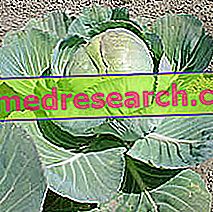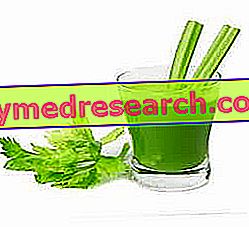
Scientific name
Brassica oleracea L.Family
CruciferaeOrigin
Plant grown everywhereUsed Parts
Drug consisting of leaves and flowerChemical constituents
- Chlorophyll;
- Vitamins;
- trace elements;
- Sulfur substances;
- Carotenoids;
- Fiber.
Cabbage in Herbal Medicine: Property of the Cabbage
Cabbage is known in medicine for its anti-inflammatory and healing properties, due to the bruised leaf applied to skin or painful joints (commercially available broccoli extracts standardized in carotenoids to be taken orally for antioxidant purposes).
Biological activity
The cabbage has healing properties attributed to both skin and mucous membranes. In fact, some studies have shown that this plant is able to perform a protective action of the gastric mucosa against hydrochloric acid produced by the same stomach.
This activity appears to be due to the regenerative capacity of the stomach mucosa exerted by a particular anti-ulcer factor present inside the cabbage juice: vitamin U. In this regard, several studies have shown how the intake of fresh juice from cabbage can be a valid aid in the treatment of peptic ulcer, increasing its healing speed.
However, despite the encouraging results obtained, this medical application of cabbage has not been officially approved.
Cabbage in folk medicine and homeopathy
The potential anti-ulcer properties attributed to cabbage have long been known also by folk medicine. In fact, in this area cabbage juice is used internally for the treatment of peptic ulcers, duodenal ulcers and gastritis.
In Indian medicine, however, cabbage leaves are used to treat a wide variety of disorders, such as asthma, coughs, haemorrhoids, gastrointestinal disorders and even thyroid disorders.
Cabbage is also used in homeopathic medicine, where it is used as a remedy for gastritis and hypothyroidism.
Contraindications
Preparations based on cabbage should not be taken in case of allergy to Cruciferae, or ascertained hypersensitivity to one or more components. Prolonged dietary intake is contraindicated in hypothyroid subjects.
Pharmacological Interactions
- behaves as an enzyme inducer at the level of the hepatic microsomal system;
- due to its vitamin K content, cabbage can inhibit the anticoagulant effect of warfarin;
- increases the metabolism of some drugs for enzyme induction activity;
- iodized drugs: interference with iodine metabolism at thyroid level due to the presence of isothiocyanates.



